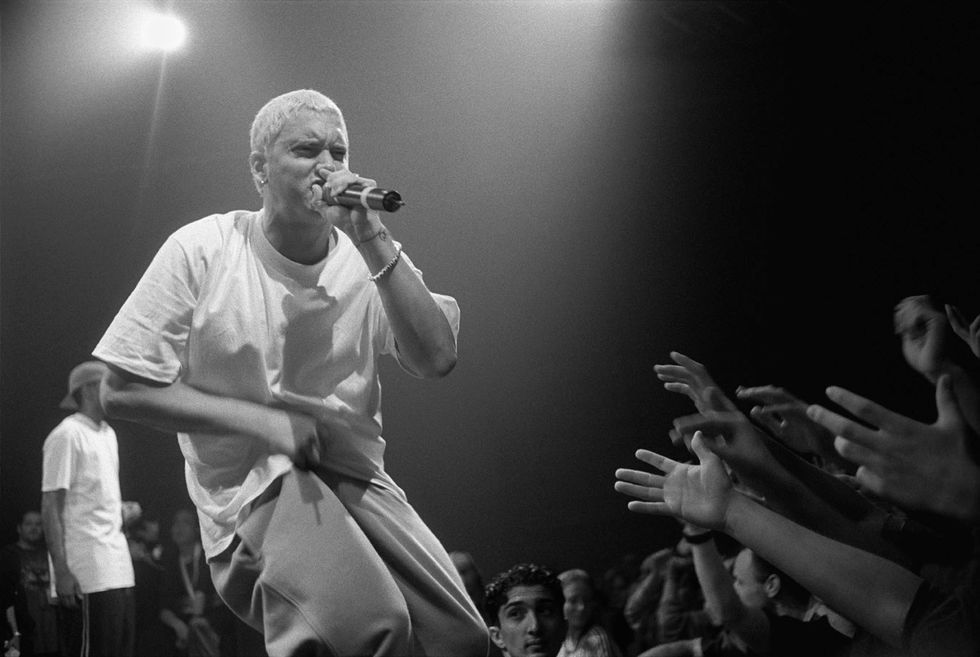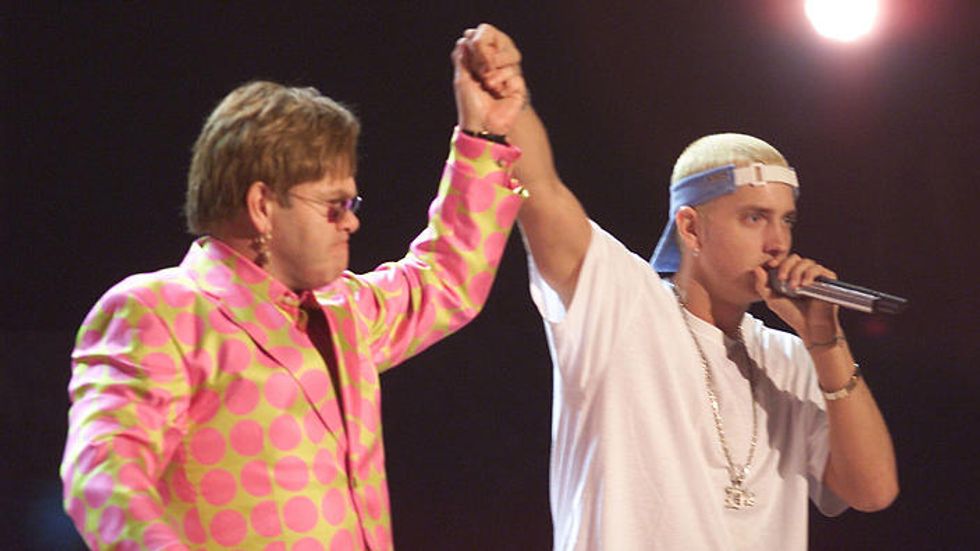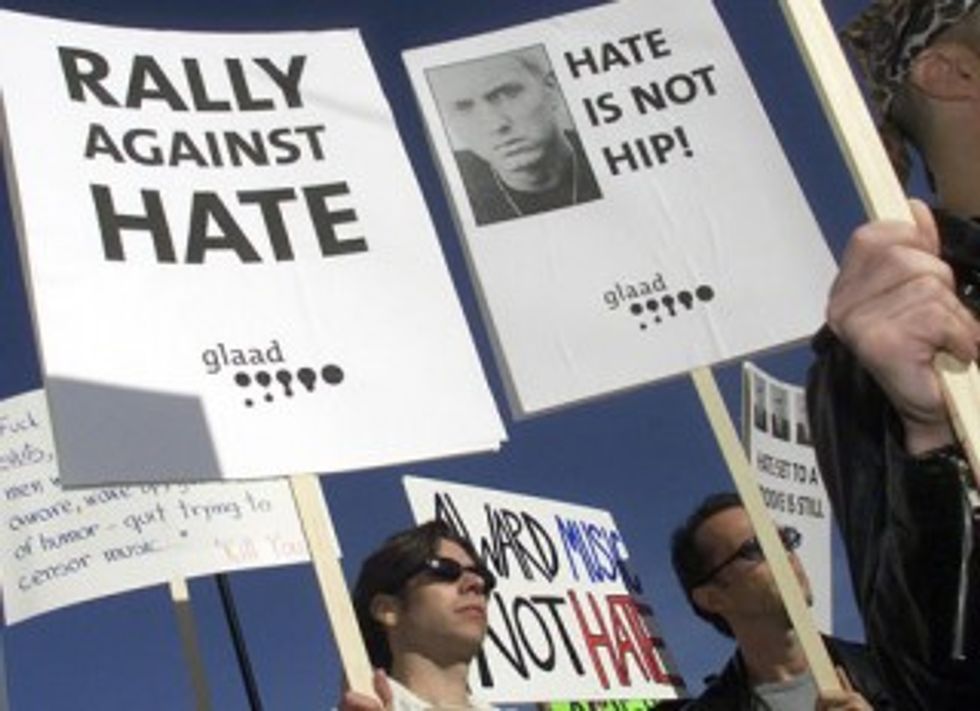Los Angeles, 2001 -- Eminem, at the height of his career and craft, was joined on the Grammy stage by Elton John to perform the hit (now a classic) “Stan” -- a powerful show of unity between the target of heated homophobia accusations and a gay icon. "The Marshall Mathers LP", which would win Best Rap Album that night, is indeed articled with numerous seemingly celebratory lashings of the gay community such as “make fun of gay clubs” and plenty of unamiable uses of “fag” and “faggot”. The performance with John was to be a grand address to those hurt by the lyrics and a gesture of camaraderie. That Em then continued to apparently bash homosexuals after, even as recently as in his 2013 album where he refers to someone “so gay I can barely say it with a straight face”, has instead led to puzzlement over what could have been a distinctly historical music & culture moment.
Elton John himself perhaps best explained the perceived waffling when he said in 2017 that Eminem was “never homophobic”. The gay slurs are simply something from his background -- insulting slang words which have little association to their original meaning (as Louis C.K. similarly suggested), the rapper has occasionally explained. Now, that words linked to specific communities would become transformed at a collective level into insults is problematic in itself, but as it is, how else is Eminem expected to use the language of his community in an earnest way? As a young Ice Cube states in “Straight Outta Compton” (the film): “Our art is a reflection of our reality”. It’s this concept of reflection which I think goes a long way in explaining much of the frankly awful content in Eminem’s music. He has always been a blatant provocateur, frequently taking the character of a rapist and murderer, even mock-bragging about things like necrophilia, bestiality, and incest. Informing all of it is the core message of his career.
"White America! I could be one of your kids.
White America! Little Eric looks just like this.
White America! Erica loves my shit.
I go to TRL, look how many hugs I get!"
This repeated chorus in between verse lines about smacking bitches and “fuck school”, it seems Em is saying “The more sick, demented, offensive, and violent I am, the more you can’t get enough; because I represent the true values of this country which people try and cast shadows on with their own flag-flying ones”. It’s honesty, genuineness and hypocrite-shucking from a joyfully pessimistic viewpoint and with execution based on shock. To anyone who has a problem, he points first to his music’s commercial success -- proof of his supposedly repulsive ideas’ resonance -- and then asks who exactly they think would be a more appropriate national voicebox. “You want me to clean up my lyrics while the president gets his dick sucked?”. While this understanding of Eminem as an artist certainly doesn’t excuse the horrible content - especially that directed at vulnerable social groups - it at least accounts for his consistency. Eminem has never been homophobic, only a crude simultaneous manifestation and living indictment of American culture; so though he hoped to make a clear stand on homophobia via the Elton John performance, his lyrics didn’t change.
Across the Atlantic, years past Eminem’s heyday, a similar discussion is taking place. Rap duo Kollegah and Farid Bang recently won the German version of a Grammy for their album which concerningly punchlines a different minority group. “Make another Holocaust/Show up with a Molotov”, they bar. While familiar explanations have been taken to -- provocation, using exaggeration to bring ugly truth into the sunlight (the best disinfectant) - antisemetism in Germany is no topic of light scrutiny.
You can’t yell “Fire!” in a crowded building -- the textbook example of the only acceptable curb on freedom of speech -- real harm. In the decision between celebration and denouncement of the kind of lyrics discussed here, this is the question of pertinence. There has been no mass execution of homosexuals in the United States, but gay people have endured hardship, even violence. Is there a scale of real suffering which determines the acceptability of taking on a topic (in anything other than a somber way)? Eminem fans know he isn’t actually a proponent of murder, but might they emulate him by using the word “fag” in a derogatorily? And if so, where does the locus of responsibility fall? The answers to these questions are not here, maybe perfect ones don’t exist. This comparison though, a study in popularity and pushed limits, is a helpful example set for discussion.







 Energetic dance performance under the spotlight.
Energetic dance performance under the spotlight. Taylor Swift in a purple coat, captivating the crowd on stage.
Taylor Swift in a purple coat, captivating the crowd on stage. Taylor Swift shines on stage in a sparkling outfit and boots.
Taylor Swift shines on stage in a sparkling outfit and boots. Taylor Swift and Phoebe Bridgers sharing a joyful duet on stage.
Taylor Swift and Phoebe Bridgers sharing a joyful duet on stage.








